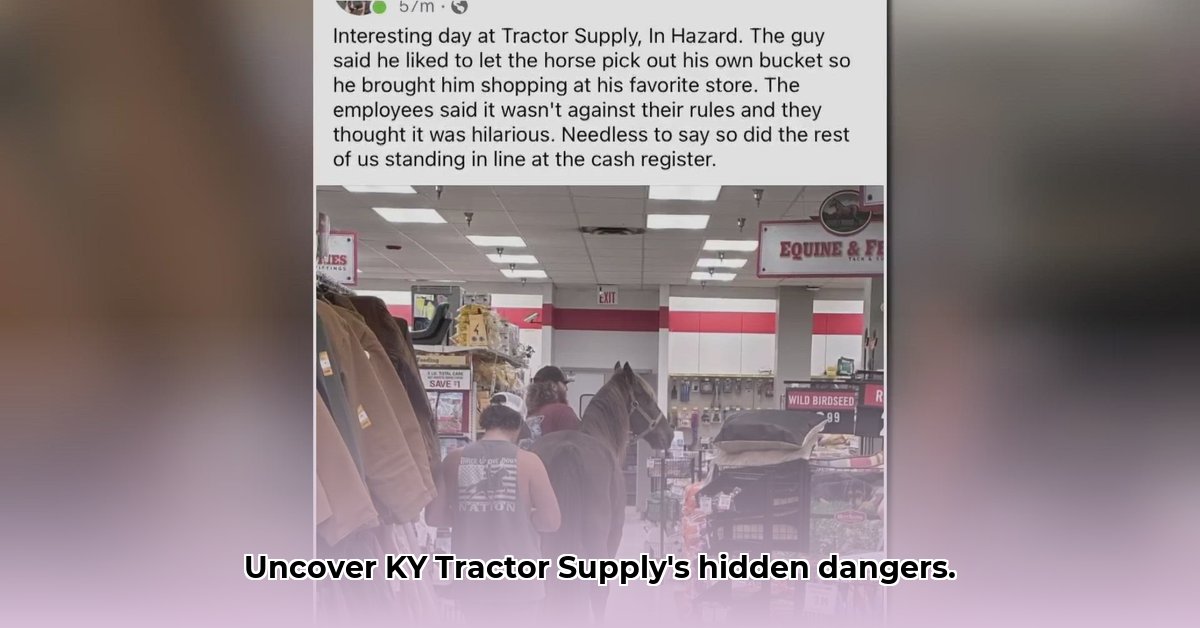
Finding the right supplies for your farm in Hazard, KY, is made easier by the presence of a Tractor Supply Company (TSC) store. For more information on this specific TSC location, visit the Hazard TSC page. This article analyzes TSC's market position, potential for growth, and the challenges it faces in the Hazard community, focusing on data-driven insights and the need for further research.
TSC's Presence in Hazard, Kentucky
The Hazard, KY Tractor Supply store, located in the Hazard Village Shopping Center, offers a wide range of products including farm supplies, pet goods, and home items. While their Monday hours are 8 AM to 9 PM, operating hours for other days require further investigation. This readily available information, however, only scratches the surface.
Data Gaps and Market Analysis: The Need for Deeper Understanding
Despite the store's apparent convenience and product diversity, crucial data is missing to fully assess TSC's performance. Specifically, the absence of sales figures prevents a precise evaluation of its market share and profitability. Understanding customer demographics (e.g., small-scale farmers versus hobbyists) is equally important for tailoring product offerings. Furthermore, a competitive analysis identifying and comparing TSC with other local retailers selling similar goods is needed to determine its relative market strength. These data gaps significantly limit a comprehensive assessment of TSC's success and future potential.
- Quantifiable Data Needed: Detailed sales figures, customer demographic breakdowns, and competitor analysis are urgently required.
- Qualitative Insights: Further research into customer needs and preferences through surveys and interviews would bolster the analysis.
Opportunities and Challenges: Navigating the Hazard Market
Opportunities exist for TSC to bolster its presence. Partnering with local farms to offer regionally sourced products could create unique appeal and strengthen community ties. Expanding product lines to cater to specific regional needs could also improve sales. However, external factors present challenges. Economic downturns directly impact consumer spending, potentially reducing demand. Additionally, evolving consumer preferences necessitate dynamic adaptation to remain competitive.
| Risk Factor | Likelihood | Potential Impact | Mitigation Strategies |
|---|---|---|---|
| Competition from other retailers | Moderate (requires further competitive analysis) | Moderate to High | Conduct comprehensive market research, develop unique product offerings or superior customer service. |
| Shifting Consumer Preferences | Moderate | Moderate | Continuous market monitoring & agile product line adjustments. |
| Supply Chain Disruptions | Low (but with significant potential impact) | High | Diversify suppliers, build strong supplier relationships, and implement robust inventory management. |
| Economic Downturn | Low (but with significant potential impact) | High | Cost control, operational efficiency improvements, and flexible pricing strategies. |
Sustainability Considerations: Environmentally Responsible Practices
The environmental impact of TSC's operations needs further investigation. Questions remain regarding the sourcing of products, packaging materials, and the overall environmental footprint of goods sold. Is TSC adequately supporting sustainable agricultural practices within Hazard? Addressing these questions requires a comprehensive sustainability audit and an analysis of TSC’s supply chain.
Recommendations for Future Growth and Research
TSC should prioritize gathering comprehensive sales data, conducting customer surveys, and analyzing its competitive landscape. Recommendations include:
- Data Collection: Implement a robust data collection system to track sales, customer demographics, and competitor activity.
- Targeted Marketing: Develop marketing strategies based on a deeper understanding of local customer needs.
- Sustainable Partnerships: Collaborate with local farmers and organizations to promote sustainable agricultural practices.
- Community Outreach: Increase engagement with the Hazard community through workshops and educational initiatives.
Local farmers should advocate for representation of local products on TSC shelves. Local government can support the development of sustainable agricultural initiatives. Further research is crucial, specifically concerning TSC's direct impact on environmental sustainability metrics within the Hazard community.
Conclusion
Tractor Supply Company plays a significant role in Hazard, KY's agricultural economy. However, a complete understanding of its impact requires addressing significant data gaps. Further research and strategic initiatives, as outlined above, are vital for TSC to optimize its contribution to the community and promote sustainable agricultural practices in the region.